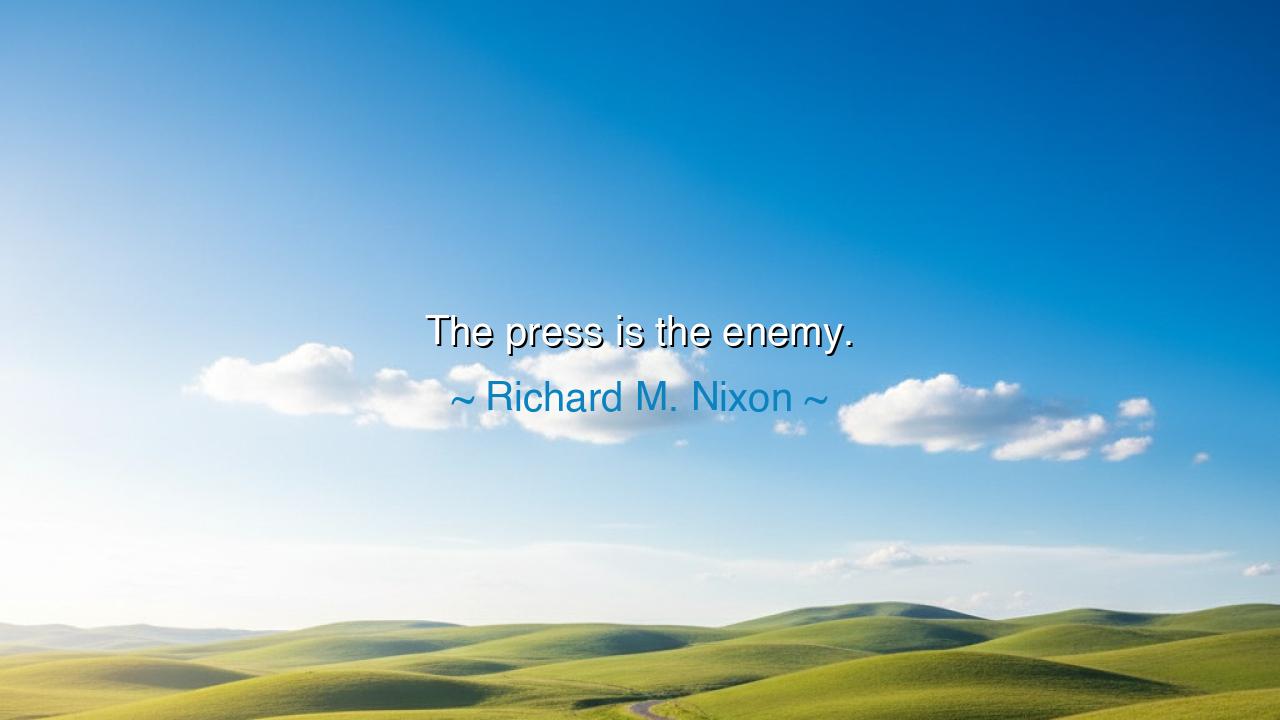
The press is the enemy.






Host: The room was quiet, the soft light from the lamp casting a calm, reflective glow across the table. Outside, the world had quieted, and the evening settled into a peaceful rhythm. Jeeny sat at the table, her fingers gently tracing the rim of her cup, absorbed in thought. Jack, standing near the window, gazed out into the darkened world, his mind clearly deep in contemplation. There was a comfortable silence between them, yet an unspoken understanding that their conversation was about to shift into something more reflective and profound.
Jeeny: (breaking the silence, her voice calm but thoughtful) “I came across something by Richard Nixon today that really made me think. He said, ‘The press is the enemy.’ What do you think about that?”
Jack: (pauses, his voice thoughtful) “It’s a pretty bold and intense statement, isn’t it? Nixon was clearly at odds with the media, especially during his presidency, and his quote reflects the antagonistic relationship he had with the press. In his mind, the press wasn’t serving the public interest—it was working against him, exposing his weaknesses and undermining his authority. It speaks to a broader tension that’s existed between politicians and the press—where the media is seen as a necessary force in a democracy, but also a threat when it challenges those in power.”
Jeeny: (nodding slowly) “Exactly. Nixon’s words suggest that the media, when it’s critical or investigative, becomes a threat rather than a tool for accountability. He saw it as an obstacle, something that could expose his flaws and actions in a way that made it hard to maintain his control over the narrative. But it also speaks to the larger issue of power and the press—it’s about how those in power often see criticism as a challenge to their authority, rather than as a check and balance.”
Host: The stillness in the room deepened as the conversation unfolded. Jack turned slightly toward Jeeny, his expression softening as he considered the deeper meaning of Nixon’s quote. Outside, the world had quieted, but inside, the conversation had shifted toward the relationship between power and the media, and how that relationship has shaped political discourse.
Jack: (his voice quieter now, more introspective) “What strikes me about Nixon’s quote is how it reflects his paranoia—his belief that the press wasn’t just doing its job, but actively working against him. The press, in his mind, wasn’t just a neutral entity—it was an enemy. And that kind of mindset can be dangerous, because it suggests that any form of criticism or scrutiny is hostile rather than constructive. It creates a disconnect between those in power and the media, which is supposed to hold them accountable.”
Jeeny: (softly) “Yes, and I think Nixon’s attitude speaks to a larger issue of trust and transparency. The media, at its best, should act as a watchdog, exposing corruption, lies, and abuses of power. But when politicians start viewing the media as the enemy, they can create a toxic dynamic where truth becomes subjective, and everything that challenges the narrative is seen as an attack. Nixon’s perspective is a reminder that secrecy and control can breed distrust, and when the press is painted as the enemy, it becomes much harder to find the truth.”
Jack: (nodding slowly) “Exactly. And it’s not just about Nixon. We see that same dynamic play out throughout history, especially when those in power feel threatened by the press. The relationship between politicians and the media is often adversarial, but it’s meant to be one of checks and balances—the press holds power to account, and power should allow for that scrutiny. When it turns into ‘us versus them,’ it becomes destructive.”
Jeeny: (smiling gently) “Yes. It’s a reminder that the press is supposed to serve the public, not just be a tool for those in power to control the narrative. It’s meant to challenge and question, and in doing so, it helps democratize information and gives people the tools they need to make informed decisions. Nixon’s quote, while certainly a reflection of his frustration, highlights the danger of ignoring that role. The press isn’t the enemy—it’s a necessary part of the system that keeps everything in check.”
Host: The quiet in the room felt deeper now, as the conversation continued to unfold into a reflection on the role of the press in democracy and its complex relationship with those in power. Jeeny and Jack had uncovered a truth in Nixon’s words—that while the press may sometimes be at odds with those in power, it is ultimately a force for accountability and transparency. Without it, democracy would be weakened, and the people would lose the ability to hold those in authority accountable.
Jack: (smiling softly, his voice more assured) “It’s a reminder that the press serves a crucial function in society, no matter how challenging it might be for those in power. Transparency and accountability are fundamental to any healthy democracy, and the press is the vehicle through which that happens.”
Jeeny: (nodding warmly) “Exactly. It’s not about fighting the press—it’s about respecting its role in helping us find the truth, even when it’s uncomfortable.”
Host: The world outside had quieted to a peaceful stillness, but inside, the room was filled with understanding. Jeeny and Jack had uncovered a deeper truth in Nixon’s words—that while the press can be seen as adversarial, it is an essential part of maintaining a healthy democracy. The media’s role in challenging those in power and holding them accountable is crucial for ensuring transparency, truth, and trust. The night continued outside, but inside, the room felt full of the realization that a free press is vital to the functioning of a democratic society.






AAdministratorAdministrator
Welcome, honored guests. Please leave a comment, we will respond soon